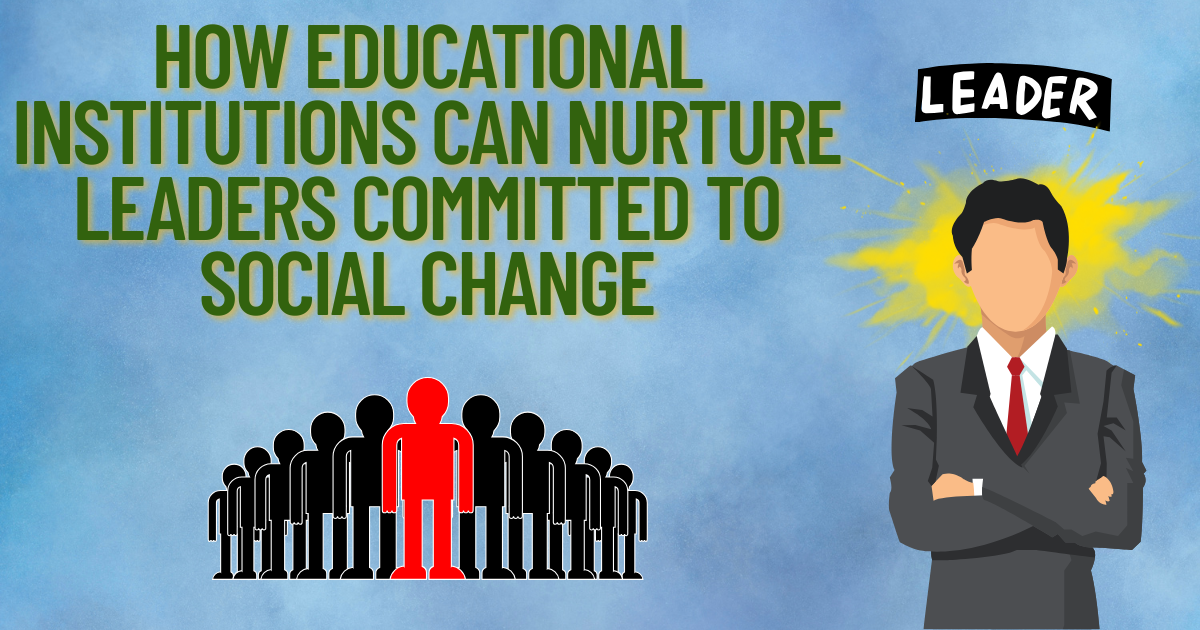How Educational Institutions Can Nurture Leaders Committed to Social Change. Leaders were also normal people before they understood what they wanted. Education plays a major role in developing the thinking of future leaders about social change. It is important to teach all students about the significance of social change so they can make it their mission in the future. If you want to learn more about the topic “How Educational Institutions Can Nurture Leaders Committed to Social Change”, read the complete paragraph.
How Educational Institutions Can Nurture Leaders Committed to Social Change
Most educational institutions are not set up in a way to teach students about leadership and its responsibilities. It is crucial to teach students the authority and responsibility that comes with a high position like a leader. Education can easily influence and contribute to social change. Educators have a very important role in forming students in a better way that they are capable of becoming a potential future leader committed to social change.

The goals of educational institutions must include changing the selection of applicants to include considering their accomplishments in social changes; taking a multidisciplinary approach and building the development of the right skills and values into the curriculum; and setting up programmes in a way that gives significant time for hands-on learning and asking partners who deliver that instruction to evaluate its impact.
Ways to Nurture Leaders Committed to Social Change
Leadership Skills: Education explains to students about the qualities of a good leader. No one is a born leader; one has to learn so much, pay attention to everything and every person, take and understand his responsibility, use his powers wisely and make social changes. The skills that every leader must have are communication, decision-making skills, problem-solving skills, and conflict resolution, framed within the context of social change.
Social Responsibility: Social responsibilities must be taught to an individual through various programmes and activities. Case studies, discussions, and projects regarding pressing social, economic, and environmental issues across various subjects are important to be incorporated in the studies.
Culture and Tradition: In education institutes, students from all types of backgrounds, cultures, and traditions come together and study together. This provides a chance for cross-cultural exchange and learning. Students must be taught about all cultures to increase diversity and inclusion, which can help students in breaking the barriers, enhance social unity, and maintain peace.
Promoting Equity: Equity refers to the state of being fair and impartial. In educational institutes, students must be taught the value of equity and how it is important in the skills of a good leader. Education institutes are hubs for innovation and research. They drive the development of new ideas, technologies, and solutions to pressing social challenges.
Creativity and Innovation: It is essential for a leader to be good at creative problem-solving and innovation to address difficult issues of the modern world, from climate change to technological advancements. Educational institutes that enhance students’ creativity and innovation not only prepare students for the workforce but also empower them to become agents of change and progress in their respective fields.
Real-world Engagement: A student must not be taught only theoretical knowledge but also must be provided practical knowledge. They assist individuals to deal with problems, make informed decisions, and handle everyday situations effectively. Educational institutions must arrange internships and apprentice programmes for students to learn on-field and gain practical knowledge. Motivational and social speakers must be invited to encourage students and provide them experienced knowledge.
Gender Equality: To change society, the most crucial step is to promote gender equality. The leader can be of any gender but must work for everyone equally. This will teach people that all people are the same and no specific gender should be given special treatment. Girls and women must be provided equal opportunity to get education and become leaders committed to economic and social change.
Challenges
There are many challenges in India while nurturing leaders committed to social change. These challenges are:
Educational institutions are not very flexible in changing or modifying curriculum. The people believe the traditional method of teaching is best and innovation can be difficult.
Educators are not well-known for their awareness, interest, and commitment to social problems. Many teachers do not even have proper resources to teach particular topics to students.
Many institutes prepare students to do a particular job instead of focusing on their talent and hard work, which results in a loss of potential future leaders.